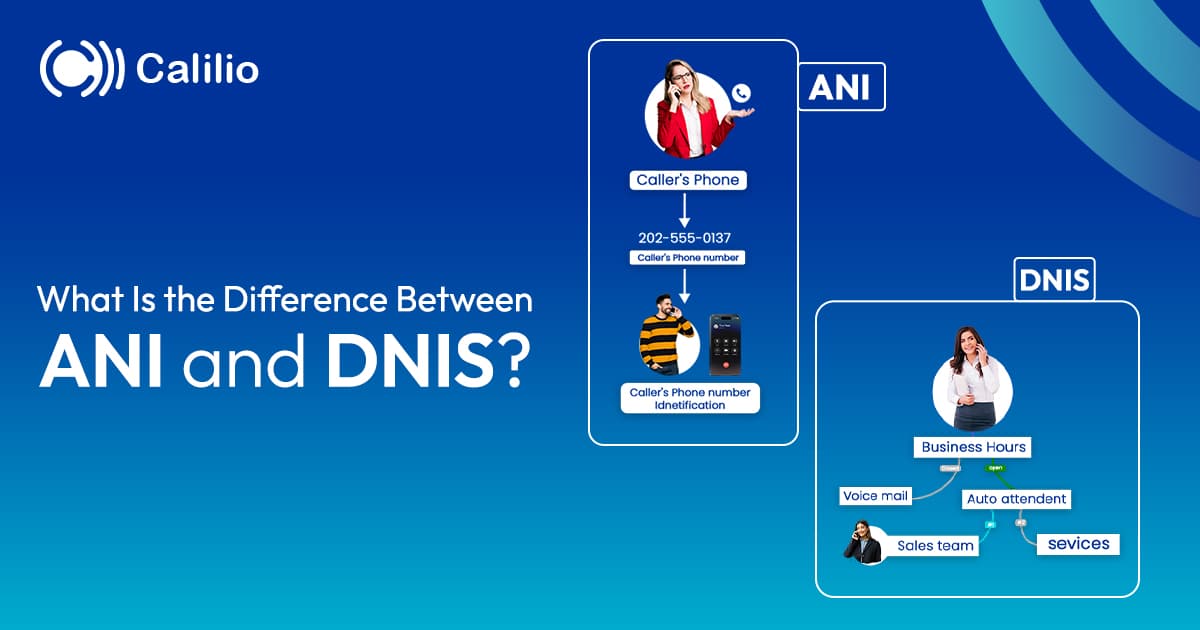ANI vs. DNIS: Automatic Number Identification (ANI) vs. Dialed Number Information Service (DNIS)

Summarize this blog with:
Every business needs to manage calls smoothly, whether handling customer support, sales, or service inquiries. To do this, phone systems rely on two important technologies: ANI (Automatic Number Identification) and DNIS (Dialed Number Information Service). These systems help identify who is calling and which number was dialed, making it easier to route calls, track numbers, and improve communication processes. While both provide important information about phone calls, they serve different purposes. In this article, we’ll explore ANI vs DNIS, how they work, and why they matter for businesses.
What is ANI (Automatic Number Identification)?
Automatic Number Identification (ANI) is a telecommunication feature that identifies a caller’s phone number, allowing businesses to recognize incoming calls, route them properly, and track caller information in real time. It operates in the background as soon as a call is placed.
ANI was originally developed by telephone companies for billing purposes, call returns, and call tracking. Today, businesses use ANI to improve call management, recognize frequent or high-value callers, and ensure important calls reach the right department quickly. In call centers, ANI helps identify returning customers, allowing businesses to access customer records and provide personalized service promptly. It enhances the customer experience and improves operational efficiency. Unlike regular caller ID, ANI always transmits the caller’s number, even if the caller tries to block it.
What is the Dialed Number Information Service System?
Dialed Number Information Service (DNIS) is a telephony feature that identifies the specific phone number a caller dialed to reach a recipient. It transmits information about the destination number, allowing the system to determine call-routing details. It means that when a call comes in, DNIS tells the business which of its numbers was dialed, helping direct the call appropriately. It also works with IVR systems to play customized greetings and menu options based on the dialed number.
DNIS plays an important role in organizations with multiple incoming lines or numbers. It enables businesses to provide a tailored experience based on the number dialed. For example, if a company has separate numbers for sales, support, and billing, DNIS helps route each call to the correct department. It ensures callers reach the right team without unnecessary transfers, enhancing customer satisfaction and operational efficiency.
What is the DNIS (Dialed Number Information Service System)?
ANI identifies the caller’s phone number, while DNIS identifies which number was dialed and directs the call to the right place.
Aspects | ANI | DNIS |
Purpose | Identifies the caller's phone number. | Identifies the number dialed by the caller. |
Function | Provides the caller's number to the recipient before the call is answered. | Indicates which specific number the caller dialed to reach the business. |
Information Provided | Caller’s phone number | Dialed destination number |
Usage | Caller identification, billing, tracking calls, enhancing customer service | Call routing, managing multiple lines or services, directing calls to appropriate departments |
Benefits to business | Know who is calling to personalize service and verify identity. | Understand why the caller is contacting to route them properly. |
Commonly used in | Caller ID systems, telemarketing, emergency services | Call centers with multiple services, businesses with several incoming lines |
Key differences | Tells who is calling | Tells which number the caller dialed |
Enhance your business call management with smart ANI and DNIS features.
How Do ANI and DNIS Impact Your Business?
ANI (Automatic Number Identification) and DNIS (Dialed Number Information Service) are essential tools that help businesses enhance communication strategies. ANI identifies the caller's number, while DNIS shows the number dialed by the caller. These features allow for personalized customer interactions, efficient call routing, and improved security, all of which contribute to better customer service and streamlined operations.

Personalized Customer Experience
By using ANI to identify the caller's number and DNIS to recognize the dialed number, businesses can provide personalized customer interaction. It allows for intelligent call routing and greeting customers by name, enhancing the overall experience. Personalized service helps address customer needs more efficiently and improves satisfaction
Efficient Call Routing
DNIS enables businesses to route calls to the appropriate department or agent based on the customer's dialed number. It reduces wait times and ensures that calls are directed to the right person, enhancing the customer experience and making call center operations more efficient.
Performance Tracking
DNIS allows businesses to track the performance of different phone numbers, such as numbers used in marketing campaigns. or customer service hotlines. It helps to assess the effectiveness of campaigns, optimize resource allocation, and identify opportunities for process improvements.
Improved Security
ANI enhances the security of phone transactions by accurately identifying the caller's phone number. It helps prevent telecom fraud and unauthorized access, providing reliable verification. ANI is a method for phone-based transactions, especially in industries where security is critical, such as banking or healthcare.
Optimize ANI and DNIS with Calilio for Enhanced Call Management
Understanding the differences between ANI and DNIS is crucial for businesses that rely on telecommunication systems. Automatic Number Identification (ANI) provides the caller's phone number, allowing organizations to know who is calling, which enhances customer service by enabling personalized interactions and efficient call tracking. The Dialed Number Identification Service (DNIS) identifies the number the caller dialed to reach the business, helping organizations understand the caller's intent. It enables precise call routing to the appropriate departments or services. Both ANI and DNIS play vital roles in improving call management and customer experience.
Calilio Introduces Affiliate Program
Earn 30% lifetime commission on every paid referral.
Turn your audience, network, or customers into a recurring revenue stream.

30% recurring commission on every paid referral

Lifetime earnings for as long as the customer stays subscribed

Unique referral link with real-time tracking

Perfect for agencies, consultants, creators, and SaaS partners

Frequently Asked Questions
What is the difference between ANI and DNIS?
The key difference between ANI and DNIS is that ANI tracks the number associated with the caller, whereas DNIS identifies the original destination number dialed by the caller to reach the recipient.
Is ANI the same as caller ID?
What does DNIS mean in telecom?
What does ANI mean in the call center?

Still have questions?
Can’t find the answer you’re looking for? Please chat with our friendly team.
Stay in the loop
Get the latest call insights, trends, and updates delivered straight to your inbox.
By subscribing, you agree to receive updates from Calilio.
You can unsubscribe anytime.